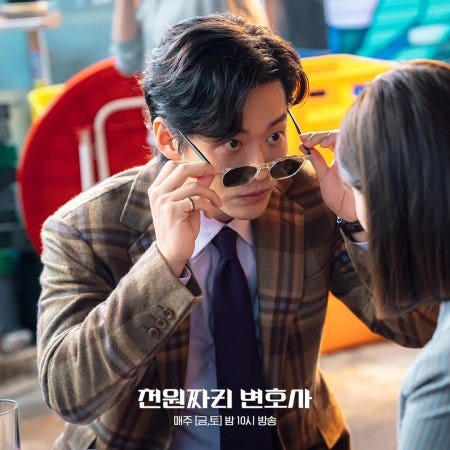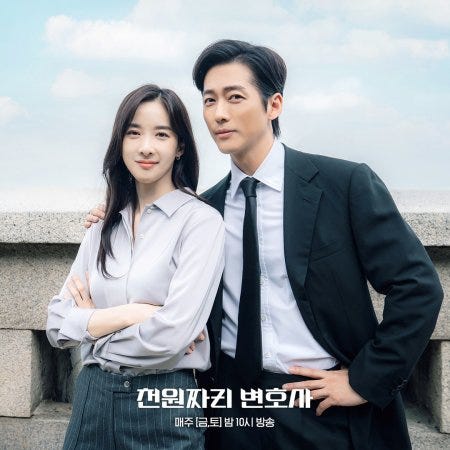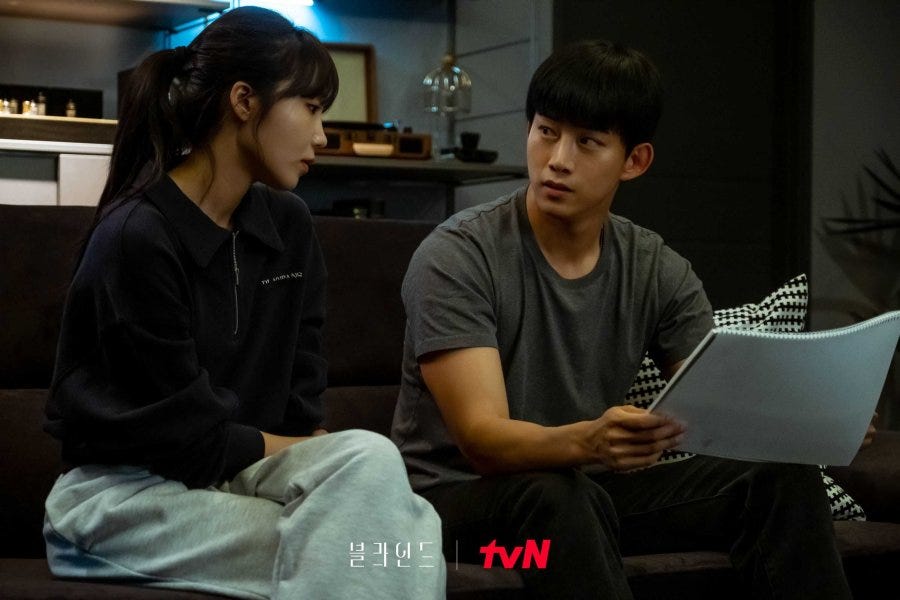One Dollar Lawyer (2022) May It Please the Court (2022) Blind (2022) Strange Tales of Tang Dynasty
I suppose I’m one of those people who can watch a lot of crime shows at any given time without feeling overwhelmed. Despite the acts of violence perpetrated in a lot of K dramas decked with amounts of the red juice that could restock an entire blood bank, K crime shows come across as being lightweight despite the dark themes explored in these stories. And I don’t just mean the One Dollar Lawyer.
The best part of One Dollar Lawyer is unquestionably the actor who is playing the titular character, Namgoong Min. He’s certainly known for his comic delivery, can carry off these ridiculous, childish moments and get away with them. In other words, he is genuinely funny. Despite being comic bookey for much of the show, the One Dollar Lawyer, Cheon Ji-hun, exudes a quirky charm that overrides the schlocky silliness. That’s not to say that the cases themselves aren’t marked by a streak of bleak realism. The rest of the cast is competent but it is Namgoong Min that does almost all of the heavy lifting as he has the lion’s share of the interactions with support and guest characters.
It follows then that the second best part of the show is Ji-hun’s superhero origin story. Up to Episode 7, the question on everyone’s lips would have been this — why did a intelligent, dogged, introverted prosecutor reinvent himself as the idiosyncratic flamboyant One Dollar Lawyer. Cheon Ji-hun was at the top of his game even with setbacks, managing to achieve results despite deliberate interference from the higher-ups. Whenever someone in a K drama (especially law enforcement) is given a nickname something along the lines of “Mad Dog”, you know that he’s earned grudging respect from his peers and superiors. Enter a sassy lawyer, Lee Ju-yeong (Lee Chung-a), from Baek Law Firm, a key person in his backstory who later becomes his fiancee. His father’s scandal and apparent resulting suicide brings them closer together.
In one of the loveliest and most romantic scenes I’ve ever seen in K drama, one night after a few drinks, a despairing Ji-hun who is grieving over his father’s death, collapses onto a paved alley with rain pouring over him. When he turns to face one side, he sees Ju-yeong lying next to him. His surprise turns into faint amusement and she reminds him that now she’s got him to smile a third time, they should start dating. They do and after two years, she tries to talk him into joining her new law firm, a place where she can help anyone she wants to regardless of the client’s ability to pay.
Ji-hun’s backstory has all the emotional beats of a well-written origins story. Of course having a versatile veteran at the heart of it doesn’t hurt. The best part of course is seeing Namgoong Min reunite with Lee Chung-a, his co-star in the sci-fi police procedural, Awaken. Their chemistry was wasted there but putting them together in a romantic relationship even for the shortest time, gives us a glimpse of what could be if someone else has the sense of bringing them together as romantic leads for another project. Tragedy inevitably strikes which is why Ji-hun has been on his own ever since.
The One Dollar Lawyer is definitionally presented as a superhero taking on the mantle and upholding the legal aspirations left behind by Ju-yeong. What lawyer can afford to run a business taking only a buck from the client? He even comes with his own hallmark colourful wardrobe and accessorizes with a pair of sunglasses. All of that is in all probability a mask to conceal an agenda he can’t yet reveal to those closest to him. Even though he likes to pretend he’s indifferent or cavalier, he is quick to defend those are treated unfairly by the system. On top of that he even has time to school the cocky Ma-ri who he must know is the successor of the Baek Law Firm.
As May It Please the Court nears the end of its run, we are getting a clearer picture behind the vigilante killings. 12 episodes is just about right for this story as there’s no need to prolong the mystery of who’s doing what to whom when the list of suspects was reduced to two by the third or fourth episode. Clearly this show was never primarily about the identity of the killer is. It is curious that up to now we’re still not entirely sure what the water torture gang were about. I don’t doubt that it was heinous enough that the killer is picking them off one at a time and that Si-baek is sticking his neck out to protect said killer.
It’s Chak-hee that I’m wholeheartedly sorry for in this entire sordid tale. Especially when she finds out what the late Chairman Jang was up to his neck in that involved her family. She thinks it’s hellish enough that Si-baek killed the man she called “grandfather” but I imagine that Si-baek is protecting her as well. Yes, he’s throwing a spanner in Jang Gi-do’s election works by turning himself in as the killer but the fact that he’s reluctant to tell her what exactly his motive is for doing so is suggestive. As the female cops says, none of it makes sense on the surface. However for Chak-hee this is the climax of her growth arc. Indeed Jung Ryeo-won is doing great work here with the best written character in the show.
Believe it or not, I’m not hate watching Blind despite all my criticisms of it. It’s the sort of thing I can switch off and enjoy in a semi-vegetative state. There are good ideas to be found and flashes of decent storytelling but it suffers from having to stretch itself over 16 episodes. Contrary to what is commonly thought, not everyone can commit murder much less become a vindictive serial killer. It requires certain conditions, opportunities and consistent characterization. Even a nutty show like this has to adhere to the most basic rules of the genre as far as how the crimes are carried out. Despite the the so-called “ta-da” big reveal moment at the end of Episode 12, the killer’s identity didn’t come as any great surprise. While the numbers associated with the boys at the Hope Welfare Centre was meant to add to the mystery, that was just general background noise and something to be filtered out when dealing with the whodunit side of things. Its real purpose was always to muddy the waters because the killer(s) had to be part of the mix.
Better than all the K dramas listed here is the C drama Strange Tales of Tang Dynasty. There’s a bit of a lull from Episode 8 to the middle of Episode 10 but it picks up again after that when the whole gang arrives in Nanzhou. Although the cases are thoughtfully and meticulously plotted, the best thing about it are the male leads who think that they have been demoted for inadvertently getting involved in the political crosshairs between the princess royal and the crown prince. As the show unfolds it becomes clear that Lu Lingfeng and Su Wuming have been sent to investigate long standing unsolved mysteries outside of Chang’an and clean up various towns and counties that have been woefully neglected. After some initial head butting, the duo find their rhythm. Lu Lingfeng who is a fuddy duddy by-the-book sort of guy has a wonderful growth arc. It’s not long before he becomes the unofficial apprentice of Su Wuming thinking his master’s thoughts after him. Although inclined to be hot-headed at times, he is amenable to reason and learns to curb his temper. What’s likeable about him is that he’s teachable, not afraid to admit that he’s wrong because he genuinely believes in service to king and country. There’s definitely an old-fashioned nobility about him that comes across as quaint. His romance with Pei Xijun is always brewing under the surface but never a priority here. Thankfully, I might add, because their chemistry isn’t the type that gets the heart racing. Mostly the so-called romance is a ploy to make her and her young family retainer permanent members of the team. It is fortunate that she’s more than just his love interest and is given a support role in the investigations whenever her skills as an accomplished painter is needed. It is also handy that her retainer becomes Lu Lingfengs’s loyal apprentice.
At this point I’ve completed 21 episodes and the gang have cracked several cases in the Nanzhou region — which runs the entire gamut from the bizarre to the macabre. While none of them have been particularly challenging to me, I enjoy watching the core characters work and interact with locals as they bring cases to a satisfying conclusion. They also showcase the relative prosperity of the Tang dynasty — advancements in medicine and the celebration of the arts — poetry, music, art and calligraphy. There are reasons why a goodly number of period detective dramas are set in the Tang era which has been seen largely as a progressive period in Chinese history until it eventually went into decline.
If there’s a Chinese drama that’s a must watch in this last quarter of 2022, this is it. (Edited to change from “third” to “last”)






